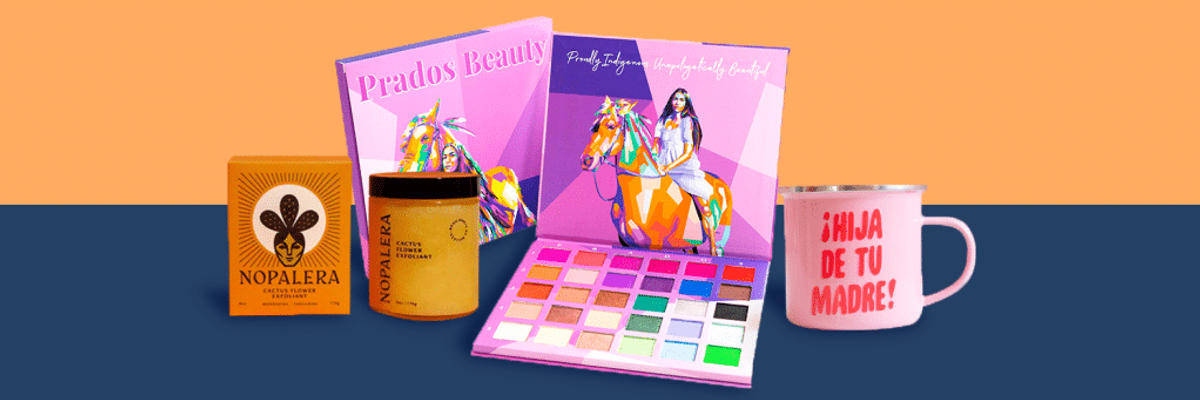
As the holiday season moves full steam ahead, the inevitable dread for those who aren’t quite the natural gift-givers begins to set in. But fear not, Luz has you covered. We’ve shared our staff gift picks and our fave food items for those pesky stockings and holiday parties. Now it’s time to keep our fave Latinx-owned businesses on the good list. You can stay off the naughty list by impressing the masses with your gift choices while also supporting Latinx products. What’s better than that?
Candles
The trick to gifting candles is gifting one the receiver relates to. Try gifting that zodiac lover a zodiac sign-themed candle. Got a quirky friend? Try a candle that smells like a celebrity (yes, these things exist). Weird, but very unique. Have a friend who is obsessed with Harry Styles? A candle exists for that too – a Harry Styles-themed candle. So, if your friend loves a good candle burning in their home we’ve got a few on our minds:
Bonita Fierce
These Latino-inspired candles are perfect. With scents that are reminders of their culture, do we even have to say anything more?

Vela Negra
If your friend isn’t into the adorable packaging and instead wants a very simple candle that still smells bomb, Vela Negra comes with all-black packaging. Ideal for them, and fits in more sober or minimalistic styles.
Books
Sometimes a thoughtful card and a handpicked book are enough. For those booklover friends you can gift them a book from their favorite author, a limited edition book, or anything that they may enjoy.
For some inspiration, we’ll give you an example. There once was a secret santa exchange for a friend who had just gotten a puppy, and knowing she would be that wild dog mom (no shame), I bought her Dogstrologyby Luna Malcolm. Yes, an astrology book about dogs so you can know their personality, weaknesses, you name it. She loved it. So as you can see, presents don’t have to be pricey; it should just make the other person think, “Wow, they really know me.”
Latinx in Publishing
So for all your book purchasing needs, Latinx in Publishing can help you purchase from independent Latinx-owned bookstores. And you can find books written by Latinas here.
Apparel
Many Latinx-owned businesses sell apparel, whether it’s a boutique, custom-made shirts, or artists’ merch. For any clothing item as a gift, make sure you know their correct size because keep in mind, many of these small retailers don’t offer exchanges. Then think about what they like, are they Bad Bunny fans? Do they wear simple tees with no design? Or do they like wearing something with a bold statement?
Hija De Tu Madre
If your friend likes wearing shirts with a relatable saying, check out Hija De Tu Madre. Any of their apparel will make your friends feel empowered, all while looking good.
Luz Shop
If you didn’t know, your fave Latina publisher also makes apparel that you can gift to all the ladies and allies in your life. Who wouldn’t appreciate a shirt that says they’re allergic to machismo?!
@hijadetumadrela #Rokeras WYA🎸👇?! Collection drops today @ 9am PT. #fyp #latina #latinas #latinx #BenefitOfBrows
Makeup
For the people who have makeup lover friends, listen up. Places other than Ulta and Sephora do exist. These Latina-owned businesses care about how the makeup looks on different shade ranges because they know Latinas come in all shades. Their product presentation also makes for a festive and fun gift. Yes, these are perfect presents to gift your friends, but who said you can’t treat yourself and buy some products for yourself too?

A La Antigüita 💦🧼 #lavaderitoss #lavadero #alaantigüita #mexicana #latina #hispana #mexicancheck #fyp #foryoupage #fypage #makeup #makeuphacks
And for those tools that touch our face almost every day, all makeup lovers should also be enthusiastic about keeping those brushes clean and bacteria-free. So for that, check out:
This mini lavadero is perfect for cleaning those makeup brushes and sponges. The mini zote’s cuteness is to die for.
@gabymarentes5 A La Antigüita 💦🧼 #lavaderitoss #lavadero #alaantigüita #mexicana #latina #hispana #mexicancheck #fyp #foryoupage #fypage #makeup #makeuphacks
Skincare
Skincare products and wellness are always good gifts to give to anyone. There are a few questions you can ask yourself to know what to buy for the other person. If you’re buying skincare, have they mentioned a product they wanted to try? Is there a natural ingredient they love and swear by? Do you want to gift them something that they need or a little extra for that self-care day? Here are a few Latinx-owned ideas:
Nopalera
They’re all about that good cactus. We all know cactus has what seems like a million uses and Nopalera has mastered the cactus for skincare. They have some cute and heavenly products for your skin and body. Their cactus flower exfoliant is a must-try and a must-have.

Today at Cultured South #atl #atlanta
Becalia Botanicals
They sell bath soaks, bath bombs, and body butter with unique scents like horchata, cocoa, coco leche, and hibiscus. Perfect gifts for anyone who wants to pamper themselves. It sounds like a dream!
@becaliabotanicals Today at Cultured South #atl #atlanta
What are you waiting for? Get on over to some of these Latinx-owned brands and wait for the smiles they produce when that gift-receiver tears away that heart-felt packaging. Sustainability pro-tip: try using newspaper and grocery store paper bags as wrapping. We haven’t bought gift wrapping paper in years! Happy Holidays!


 Promotional image provided by On Point Studios.
Promotional image provided by On Point Studios.  Promotional image provided by On Point Studios.
Promotional image provided by On Point Studios. 






